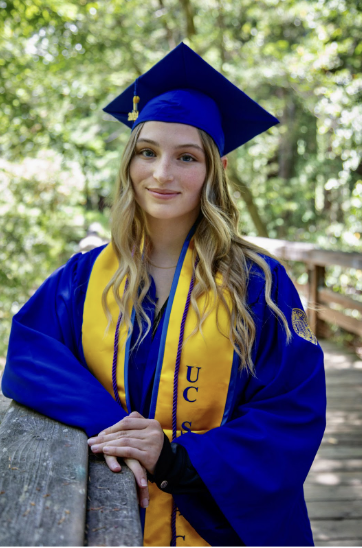Student Stories: How an Undergraduate Student Became a Leader in our Department

Zoë Shmidt (she/her) is a fifth-year transfer student from Los Angeles. She is interested in biological and biocultural anthropology with a focus on what can be learned from a genetic perspective using paleogenomic methodology.
Describe your involvement in the Anthropology Department. What do you do directly or indirectly? When did you get started?
My involvement in the department started during my second year at UCSC. I have been a Peer Advisor and Writing Tutor for the Anthropology Department for the last two years, working directly in the department building. I also worked in the UCSC Paleogenomics Laboratory as a Laboratory Assistant for two years, undertaking a senior thesis which I was able to present at the Biennial Graduate Student Conference in 2024, hosted by the Friends of Lambda Alpha National Anthropology Honor Society. Lastly, I am one of the co-founders and leaders of the Diversity in Anthropology (DIA) student club.
What initially drew you to anthropology? Please describe your research interests, questions, etc.
I think I was always interested in the questions anthropology poses, and I’ve always been fascinated by genetics, but I didn’t know what anthropology was until I took a formative class at my community college. After this class, I knew anthropology was what I wanted to study. UCSC seemed a natural choice since we have one of the only Paleogenomics laboratories in the country. I am interested in questions regarding population genetics and variants, hominin genetics, and introgression or admixture. However, I am still finding my unique niche within this broad discipline!
What sustained your interest in anthropology? In other words, what learning opportunities (labs, professors, assignments, courses, internships, etc.) kept your interest?
The main forces that sustained my interest were all the amazing academic allies I met along the way. Lars Fehren-Schmitz is an incredibly supportive PI (Principal Investigator) and Kalina Kassadjikova is an amazing graduate student mentor. Their support, along with the other graduate and undergraduate students in our lab group, was exceptionally encouraging. I also attended a field school in Macedonia in the Summer of 2023, run by Sarah Lacy and Darko Stojanovski; this experience was invaluable. Sarah & Darko taught me so much about what it means to be an anthropologist. All of the anthropology classes I took at UCSC were taught by wonderful professors who only further encouraged my journey as I learned more about how wide-reaching the discipline is.
Which experience in the Anthropology Department means the most to you? Which one was your favorite?
Getting to work in the anthropology office through peer advising and writing tutoring was by far my favorite. Through these opportunities, I was able to build academic relationships with faculty members and students alike. Anthropology is such a broad discipline that it was fascinating to get little snapshots into different parts of the field through passing conversations with faculty members, reading and editing student essays, and chatting with students about their classes. I learned so many new things this way, things I never would have come across in my studies because there is simply not enough time to learn it all, especially in anthropology.
How have these opportunities been beneficial for you? How do these relate to your future goals?
By participating in all of these different opportunities, I was able to hone in on the questions that truly interest me and see where I want my academic path to lead. I was also able to talk to so many different individuals, receiving their advice on how to best navigate academia. Now, I have a better idea of where I want to go and how I am going to get there.
What will being a graduate of the UCSC Anthropology Department mean to you?
Being a graduate of the UCSC Anthropology Department signifies not just an academic achievement, but a journey of understanding and embracing diversity. Throughout my time in the department, I've been immersed in a rich tapestry of cultures, perspectives, and experiences. This exposure has expanded my knowledge and deepened my appreciation for the multitude of ways in which humanity exists and thrives. I am profoundly grateful for the opportunity to learn from both my peers and mentors, who have collectively shaped my worldview and instilled in me a commitment to inclusivity and understanding. As a graduate, I carry with me not only a degree but also a sense of responsibility to continue fostering discourse and empathy in an interconnected world.
Any tips or guidance you would like to share with students?
The best advice I can give to students is to focus on building your academic network. Reach out to faculty members whose work interests you. Befriend students who study topics similar and dissimilar to your own. Go to club meetings, office hours, and workshops. Don’t hesitate to apply for that job or enrichment opportunity, even if you think the odds are against you. I know it can be scary or overwhelming, so I encourage students to approach these opportunities and conversations with deep curiosity. Don’t be afraid not to know; ask questions! We all start somewhere. The best way to build up one’s knowledge base is to be honest about your unfamiliarity, and be authentic in your pursuit of knowledge.
Interview questions created by Donovan Sayegh-McFann (he/him), a third year undergraduate student and a Peer Advisor in the Anthropology Department.
